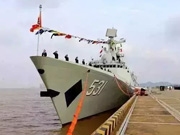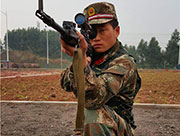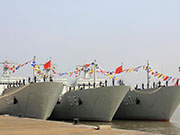

Esteemed Deputies,
Let me now brief you on the main targets, tasks, and measures for the period of the 13th Five-Year Plan from 2016 through 2020.
On the basis of the CPC Central Committee Recommendations for the 13th Five-Year Plan for Economic and Social Development, the State Council has drawn up the draft of the 13th Five-Year Plan for Economic and Social Development and submitted it to this session for your review and approval.
The draft, centering on the goal of finishing building a moderately prosperous society in all respects and designed to address serious issues such as unbalanced, uncoordinated, and unsustainable development, stresses the need to promote innovative, coordinated, green, open, and shared development. It proposes the main targets and tasks for economic and social development over the next five years as well as development policies, initiatives, and projects. The following are the six areas highlighted in the draft.
-- We should work to maintain a medium-high rate of growth and promote the development of industries toward the medium-high end.
To finish building a moderately prosperous society in all respects and double the 2010 GDP and per capita personal income by 2020, the economy needs to grow at an average annual rate of at least 6.5% during this five-year period. To that end, we will move faster to improve or upgrade the structure of industry and launch initiatives that use advanced technologies and can drive industrial development. Our goal is that by 2020, advanced manufacturing, modern services, and strategic emerging industries as a proportion of GDP will have risen significantly and that per capita labor productivity will have risen from 87,000 yuan to over 120,000 yuan. By that time, China's aggregate economic output should have exceeded 90 trillion yuan, and the quality and efficacy of development should have significantly improved. For a developing country like China with such a large population, this will be a truly remarkable achievement.
-- We should ensure that innovation better drives and energizes development.
Innovation is the primary driving force for development and must occupy a central place in China's development strategy, which is why we must implement a strategy of innovation-driven development. We should launch new national science and technology programs, build first-class national science centers and technological innovation hubs, help develop internationally competitive high-innovation enterprises, and establish pilot reform zones for all-round innovation. We should make consistent efforts to encourage the public to start businesses and make innovations. We should promote the extensive application of big data, cloud computing, and the Internet of Things. We need to move faster to transform China into a manufacturer of advanced and quality products and a country that is strong on intellectual property rights. We should strive to achieve major breakthroughs in basic research, applied research, and research in strategic and frontier fields by 2020. China's investment in research and development is expected to reach 2.5% of GDP, and the contribution of scientific and technological advances toward economic growth should come to reach 60%. Fulfilling these objectives will turn China into an innovative and talent-rich country.
-- We should make progress in new urbanization and agricultural modernization as well as in balancing development between urban and rural areas and between regions.
Narrowing the gap between urban and rural areas and between regions is not only a key part of economic structural adjustment; it is also crucial for unleashing developmental potential. We should advance the new, people-centered urbanization. This will mean granting urban residency to around 100 million people with rural household registration living in urban areas and other permanent urban residents, completing the rebuilding of both rundown areas and "villages" in cities involving about 100 million people, and enabling around 100 million rural residents to live in local towns and cities in the central and western regions. By 2020, permanent urban residents should account for 60% of China's population, and 45% of the Chinese people should be registered as permanent urban residents.
We should launch initiatives to develop water conservancy in agriculture, farming machinery, and the modern seed industry, encourage appropriately scaled-up agricultural operations, and promote regional distribution, standardized production, and commercial agricultural services. By 2020, the supply, quality, and safety of food crops and other major agricultural products should be better ensured, notable headway should have been made in modernizing agriculture, and fresh progress should have been made in developing the new countryside.
Guided by the general strategy for regional development, we should pursue the Three Initiatives to form north-south and east-west intersecting economic belts along the coastline, the Yangtze River, and major transportation routes, and foster new growth poles and city clusters that facilitate the development of surrounding areas. We should also expand major infrastructure projects, with the aim of increasing the length of high-speed railways in service to 30,000 kilometers and linking more than 80% of big cities in China with high-speed railways, building or upgrading around 30,000 kilometers of expressways, and achieving full coverage of access to broadband networks in both urban and rural areas.
Note:
* To finish building a moderately prosperous society in all respects by the time the CPC celebrates its centenary in 2021 and to turn the People's Republic of China into a modern socialist country that is prosperous, strong, democratic, culturally advanced, and harmonious by the time it celebrates its centenary in 2049.
-- We should encourage green ways of working and living and speed up efforts to conserve ecosystems and the environment.
We need to protect the environment while pursuing development and achieve development in a well-protected environment, making sustained efforts to build a sound ecological system. We need to take serious action to prevent and control air, water, and soil pollution, set a red line that the country's total area of ecological spaces should not fall below, move forward with eco-friendly projects to protect and restore mountains, waters, forests, and farmlands, and intensify ecological conservation and restoration efforts. Over the next five years, we should aim to ensure that water consumption, energy consumption, and carbon dioxide emissions per unit of GDP are cut by 23%, 15%, and 18%, respectively, and that forest coverage reaches 23.04%. We should also make it our aim, within this timeframe, to develop and use energy and resources much more efficiently and make improvements to the quality of ecosystems and the environment. In particular, we should strive for major progress in the control and prevention of air pollution and see to it that the air quality of cities at and above the prefectural level is good or excellent for 80% of the year. We must work to build, through tireless efforts, a Beautiful China where the sky is blue, the land is green, and the water runs clear.
-- We need to deepen reform and opening up to create new institutions for development.
Fundamentally, development relies on reform and opening up. We must deepen reform across the board, uphold and improve the basic economic system, establish a modern system of property rights, and see that a rule of law government is basically in place. It should be ensured that the market plays the decisive role in resource allocation and the government better plays its role, and work should be accelerated to create the systems, mechanisms, and growth model that will guide the new normal in economic development.
We should work for significant progress in pursuing the Belt and Road Initiative and for breakthroughs in our cooperation with other countries on industrial capacity. We should promote the optimization of imports and exports, significantly increase the proportion of trade in services, and promote China's transformation from a trader of quantity to a trader of quality. We should put into force across the board the management system for pre-establishment national treatment plus a negative list, and progressively build a network of high-standard free trade areas. With these efforts, we should be able to usher in a new phase in building an open economy based on new systems.
-- We need to ensure that continuous progress is made in raising living standards, and see that everyone shares in the fruits of development.
Guided by the vision of people-centered development, we need to continue to strengthen points of weakness in meeting basic needs for the people in order to achieve common prosperity. We need to fight hard to win the war against poverty and help lift out of poverty all rural residents falling below the current poverty line, and achieve poverty alleviation in all poor counties and areas.
We should put in place a national catalogue of basic public services. We should establish more equitable and sustainable social security systems. We need to ensure that all schools providing compulsory education comply with educational standards, that everyone has access to secondary education, that China has more world-class universities and first-class fields of discipline, and that the average number of years of schooling received by the working-age population increases from 10.23 to 10.8 years.
We need to create 50 million plus new urban jobs. We need to improve the income distribution system, reduce the income gap, and increase the proportion of the middle-income group in the whole populace. We should improve systems of government housing support, which should include the rebuilding of 20 million housing units in rundown urban areas.
We need to work for progress in building a Healthy China and achieve a one-year increase in average life expectancy. We need to respond proactively to population aging. We should build a modern system of public cultural services and put into effect cultural programs to boost civic morality and keep Chinese culture thriving. These efforts should enable people not only to enjoy a better life in material terms, but also to live a more enriching intellectual and cultural life.
To achieve success in our work to promote economic and social development during the period of the 13th Five-Year Plan and finish building a moderately prosperous society in all respects, we must keep to the following three guidelines:
First, give top priority to development
Development is of primary importance to China and is the key to solving every problem we face. During the next five years, we must take particular care to avoid falling into the "middle-income trap," and we need to address an increasing number of problems and risks. Pursuing development is like sailing against the current: you either forge ahead or drift downstream. We must remain committed to economic development as our central task, endeavor to promote sound development, and respond effectively to risks and challenges so as to ensure that China's economy, like a gigantic ship, breaks the waves and goes the distance.
Second, make major headway in carrying out structural reform
At present, we face problems both with aggregate supply and demand and with our structures. The structural problems are more acute, and reform should be conducted to adjust these structures. While working to achieve an appropriate expansion of aggregate demand, we need to give particular emphasis to structural reform on the supply side, reducing supply in some areas while increasing it in others. This means that we need to reduce ineffective and lower-end supply while increasing effective and medium- and high-end supply, increase the supply of public goods and services, ensure that development is driven by both supply and demand, and improve total-factor productivity. This should enable us to unleash and develop productive forces.
Third, accelerate the shift in driving forces for development
In the course of economic development, it is only natural that old drivers of growth are replaced by new ones. As conventional driving forces weaken, it is critical that new driving forces emerge and that the conventional ones undergo a transformation so that new twin engines are formed; only then is it possible to upgrade the economy and achieve sustainable growth. This is the crucial period in which China currently finds itself, and during which we must build up powerful new drivers in order to accelerate the development of the new economy. We need to move faster to develop new technologies, industries, and forms of business, boost the development of a sharing economy through institutional innovations, create sharing platforms, and develop emerging industry clusters such as high-tech and modern service industry clusters, thus creating strong new engines. We will use network-based information technology and other modern technologies to drive changes in models of production, management, and marketing, create new industry chains, supply chains, and value chains, and transform and upgrade conventional drivers, thus injecting them with new vitality.
Ultimately, it is the people who are the inexhaustible source of power that drives development. A workforce of over 900 million, of whom over 100 million have received higher education or are professionally trained: this is our greatest resource and strength. Obviously, replacing old drivers of growth with new ones and achieving a shift in development toward greater reliance on human resources, human capital, and innovation is a process of painful adjustment. But it is at the same time an upgrading process with great promise. We just have to get through this process, and we can, without question, reinvigorate the economy and ensure its dynamic growth.
Looking ahead to the next five years, we are fully confident that we will finish building a moderately prosperous society in all respects within the set timeframe, that our people will enjoy better lives, and that there will be an even brighter future for the cause of building socialism with Chinese characteristics.
 |  |
Day|Week

 96-Year-Old Veteran Becomes Fashion Icon
96-Year-Old Veteran Becomes Fashion Icon Creative mother produces 232 unique breakfasts
Creative mother produces 232 unique breakfasts Charming folk customs in Kalajun Grassland
Charming folk customs in Kalajun Grassland A glimpse of ships and boats commissioned to PLA Navy in past 3 years
A glimpse of ships and boats commissioned to PLA Navy in past 3 years Chongqing sniper’s new record: 13 holes on a rice grain
Chongqing sniper’s new record: 13 holes on a rice grain Women put on spring dresses in Hangzhou
Women put on spring dresses in Hangzhou UAVs at Unmanned Systems Exhibition & Conference in UAE
UAVs at Unmanned Systems Exhibition & Conference in UAE PLA's paratroopers conduct night training
PLA's paratroopers conduct night training Three new-type tank landing ships join the East China Sea Fleet
Three new-type tank landing ships join the East China Sea Fleet 3,492 reflector panels of China's mega telescope installed
3,492 reflector panels of China's mega telescope installed